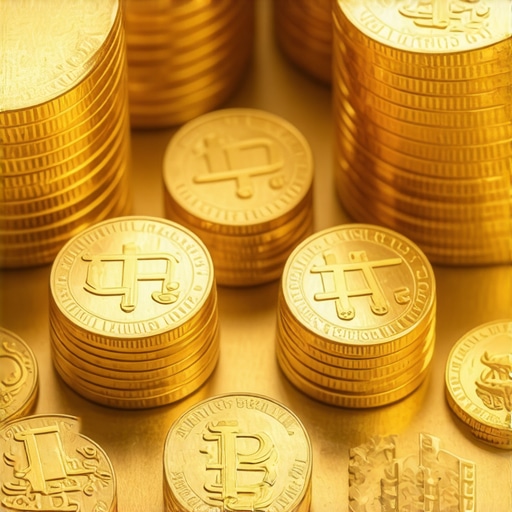Unlocking the Treasure: Why Investment-Grade Gold Coins Matter
Gold coins have long been a symbol of wealth, security, and tangible value. For investors seeking to diversify their portfolios with physical assets, understanding how to identify investment-grade gold coins is crucial. These coins offer not only intrinsic value but also potential appreciation, liquidity, and protection against inflation and economic uncertainty.
Spotlight on Quality: Defining Investment-Grade Gold Coins
Investment-grade gold coins are typically characterized by their purity, recognized authenticity, and legal tender status. Coins such as the American Gold Eagle, Canadian Gold Maple Leaf, and South African Krugerrand are renowned for their high gold content—usually 22K to 24K—and widespread market acceptance. Their value derives from both the gold content and numismatic appeal, although for investment purposes, purity and liquidity take precedence.
What Are the Key Factors to Consider When Choosing Investment-Grade Gold Coins?
When selecting gold coins for investment, consider the following factors:
- Purity and Weight: Look for coins with at least 22 karats of gold purity, commonly measured as .9167 or higher, with a standard weight such as one troy ounce.
- Mint Reputation: Coins minted by reputable institutions, such as the U.S. Mint or Royal Canadian Mint, ensure authenticity and quality.
- Market Liquidity: Investment-grade coins should be widely recognized and easily tradable globally.
- Premium Over Spot Price: Understand the premium charged over the current gold spot price, as excessive premiums can reduce investment returns.
- Condition and Certification: Coins certified by trusted grading services like the Professional Coin Grading Service (PCGS) or Numismatic Guaranty Corporation (NGC) often command better prices and trust.
Beyond the Shine: Practical Tips for Verifying Authenticity and Value
Experience shows that counterfeit gold coins are a persistent risk in the market. To protect your investment:
- Use a reliable gold testing kit or electronic verifier to confirm purity.
- Purchase only from trusted dealers who provide transparent provenance and certification; see how to choose trusted dealers.
- Familiarize yourself with coin specifications, such as dimensions, weight, and design features, to spot anomalies.
- Consider third-party appraisal or grading to document condition and authenticity.
Investment Strategies: How Gold Coins Fit into Your Portfolio
Gold coins serve as a hedge against inflation and market volatility, complementing stocks, bonds, and digital assets. For a balanced approach, explore insights on balancing gold and stocks to optimize risk and returns. Additionally, consider the benefits of physical gold compared to digital alternatives in this detailed guide.
Ready to Dive Deeper? Share Your Thoughts and Questions!
Have you started investing in gold coins or are you considering it? Leave a comment below with your experiences or queries, and share this guide with fellow investors looking to secure their financial future.
For authoritative information on gold coin standards and investment practices, the Investopedia gold coin overview offers valuable insights.
Understanding Market Trends: How Global Events Influence Gold Coin Values
Gold coin prices are not only affected by intrinsic factors like purity and mint reputation but also by macroeconomic events and geopolitical tensions. For example, during times of economic uncertainty or inflationary pressures, investors flock to gold as a safe haven, driving up demand and prices. Additionally, monetary policies, currency fluctuations, and central bank gold purchases play a pivotal role in shaping market dynamics. Understanding these external influences can help investors time their purchases and sales more strategically. For a comprehensive look at how economic climates affect gold demand, explore this insightful resource.
Exploring the Role of Gold Mutual Funds and ETFs in Diversification
While physical gold coins provide tangible asset security, gold mutual funds and ETFs offer liquidity and ease of trading. These investment vehicles pool resources to invest in gold-related assets such as bullion, mining stocks, and futures. They provide an alternative for investors seeking exposure to the gold market without the complexities of storage and authentication. For those considering a balanced portfolio with exposure to both physical and paper gold, understanding the benefits and strategies behind gold ETFs and mutual funds is essential. Learn more at Building Wealth with Gold ETFs and Mutual Funds in 2025.
How Can You Balance Physical Gold Coins and Digital Gold Investments for Optimal Growth?
This question is increasingly relevant as investors weigh the security of physical gold against the convenience of digital assets. Physical gold coins offer protection from digital fraud and volatility, whereas ETFs and mutual funds provide liquidity and diversification. A hybrid approach often yields the best results, blending the stability of tangible assets with the flexibility of paper investments. Factors like investment goals, risk tolerance, and market conditions should guide your allocation. To explore this further, check out our detailed comparison in Physical Gold vs. Gold ETFs: Which Is Best for You?.
Key Tips for Securing and Storing Your Gold Coins Safely
Once you’ve acquired investment-grade gold coins, safeguarding them is paramount. Investors should consider secure storage options such as bank safety deposit boxes, professional vault services, or high-quality home safes with insurance coverage. Proper storage not only protects against theft and damage but can also preserve the coin’s condition and value. Additionally, maintaining documentation and certification enhances resale prospects. For expert advice on choosing trusted dealers and secure storage methods, visit Physical Gold Investment: Choosing Trusted Dealers in 2025.
Fortifying Your Fortune: Modern Security Solutions for Gold Coin Storage
Storing investment-grade gold coins securely is as crucial as selecting the right coins. Traditional methods like bank safety deposit boxes offer robust protection, but emerging technologies and services provide investors with enhanced peace of mind and accessibility. Exploring options such as private vaulting services, smart home safes with biometric locks, and insured transport can elevate your gold security strategy.
What Are the Most Effective and Innovative Ways to Store Gold Coins Safely?
Effective gold storage balances security, accessibility, and cost. Here are some advanced methods favored by savvy investors:
- Private Vault Facilities: Specialized vault companies offer high-security storage with insurance coverage and convenient access. Examples include Brinks and Loomis, which cater to both individual investors and institutions.
- Smart Safes with Biometric Security: Integrating fingerprint or retina scanners, these safes deter unauthorized access while providing quick retrieval.
- Home Vaults with Climate Control: Besides security, maintaining optimal humidity and temperature helps preserve coin condition and avoid tarnish or degradation.
- Insurance Considerations: Regardless of storage choice, comprehensive insurance against theft, loss, and damage is essential for protecting your investment.
Ensuring your storage method meets your personal risk tolerance and lifestyle needs can prevent costly losses and maintain the integrity of your gold holdings.
Understanding the Impact of Storage on Gold Coin Value and Liquidity
Storage quality directly influences the coin’s physical condition, which affects its resale value and market desirability. Coins kept in pristine condition with proper certification often command premiums when sold. Conversely, poorly stored coins risk scratches, oxidation, and wear, diminishing their appeal and price. Moreover, flexible storage solutions that facilitate easy access encourage timely trading opportunities in fluctuating markets.
According to the U.S. Mint’s coin care guidelines, proper handling and storage are critical to preserving a coin’s luster and value over time.
Expert Advice: How to Choose the Right Dealer for Secure Gold Transactions and Storage Services
Partnering with reputable dealers who offer trustworthy storage solutions is vital. Look for dealers who provide transparent provenance, certified coins, and optional vaulting services. Reading customer reviews, verifying credentials, and confirming insurance policies can ensure a smooth, secure transaction process.
For insights into identifying reliable dealers and storage providers, visit Physical Gold Investment: Choosing Trusted Dealers in 2025.
What Should Investors Ask Dealers About Storage and Security Before Buying?
- Do you offer insured storage options or partnerships with vaulting facilities?
- Can you provide certification and provenance documentation for all coins?
- What are the terms and costs associated with storage and retrieval?
- How do you handle authentication and counterfeit detection?
Engaging in thorough due diligence mitigates risks and bolsters confidence in your gold investments.
Ready to secure your gold investment effectively? Explore trusted storage options and dealer partnerships today to protect your wealth for years to come.
Navigating Tax Implications and Legal Considerations in Gold Coin Investments
Beyond security, understanding the tax landscape surrounding gold coin ownership is essential. Tax treatment varies by jurisdiction and can impact capital gains, estate planning, and reporting requirements. Working with a qualified financial advisor or tax professional ensures compliance and strategic planning tailored to your investment horizon.
For an overview of tax considerations related to precious metals, the IRS Precious Metals Tax Information provides authoritative guidance.
Modern Innovations in Gold Coin Storage: Beyond Traditional Safeguards
As gold coin investors seek to protect their tangible assets, the evolution of storage technology offers unprecedented security and convenience. Beyond conventional bank safety deposit boxes, innovative solutions such as biometric home safes and specialized private vault facilities have gained traction. These technologies combine cutting-edge access control with climate management, ensuring both security and preservation of coin value over time.
Moreover, the rise of insured transport services streamlines the transfer of valuable coins between locations while mitigating risks associated with theft or loss. Embracing these advancements allows investors to tailor storage strategies aligned with their risk tolerance and lifestyle needs.
Decoding Tax Implications: Navigating Legal Complexities of Gold Coin Ownership
Tax considerations play a pivotal role in the net returns of gold coin investments. Depending on jurisdiction, gold coins might be subject to capital gains tax, sales tax, or specific precious metal tax rules. For instance, in the United States, the IRS treats gold coins as collectibles, which can influence long-term capital gains rates. Additionally, reporting requirements and valuation methods for estate planning purposes require careful attention.
Collaborating with a qualified tax professional familiar with precious metals is highly recommended to optimize tax outcomes and ensure compliance. To deepen your understanding, consult the IRS Precious Metals Tax Information for authoritative guidance.
Maximizing Investment Security Through Strategic Dealer Partnerships
Choosing the right dealer is integral not only for acquiring authentic investment-grade gold coins but also for securing reliable storage and after-sale services. Trusted dealers often provide comprehensive solutions including certified authentication, insured vaulting options, and transparent provenance documentation.
Engaging in thorough due diligence by verifying dealer credentials, reading customer reviews, and understanding storage terms mitigates risks and enhances confidence in your investment journey.
What Are the Best Practices for Verifying Dealer Credibility and Storage Services?
Investors should inquire about the dealer’s insurance coverage, storage partnerships, authentication processes, and fee structures. Confirming these details upfront helps prevent potential pitfalls and ensures a seamless transaction and storage experience. For practical tips, explore Physical Gold Investment: Choosing Trusted Dealers in 2025.
Engage with Us: How Are You Planning to Secure and Grow Your Gold Coin Portfolio?
Your investment journey is unique—whether you’re just starting or expanding your collection. Share your strategies, ask questions, or discuss challenges in the comments below. Connect with a community of informed investors and leverage expert insights to fortify your financial future.
Frequently Asked Questions (FAQ)
What defines a gold coin as investment-grade?
Investment-grade gold coins are characterized by high purity (typically 22K to 24K), legal tender status, recognized authenticity, and widespread market acceptance, ensuring liquidity and intrinsic value.
How can I verify the authenticity of a gold coin?
Use gold testing kits or electronic verifiers, purchase from reputable dealers, check coin specifications like weight and dimensions, and consider third-party grading services such as PCGS or NGC for certification.
What are the best storage options for gold coins?
Secure storage options include bank safety deposit boxes, private vault facilities with insurance coverage, smart safes featuring biometric security, and climate-controlled home vaults to preserve coin condition.
Are there tax implications when investing in gold coins?
Yes, tax treatment varies by jurisdiction and may include capital gains, sales tax, or collectible tax rates. Consulting a qualified tax professional ensures compliance and optimized tax planning.
How do global events affect gold coin values?
Economic uncertainty, inflation, geopolitical tensions, and monetary policies influence gold demand and prices, often increasing gold coin values during market volatility as investors seek safe-haven assets.
Should I invest in physical gold coins or gold ETFs?
A hybrid approach often works best; physical coins provide tangible security and protection against digital risks, while ETFs offer liquidity and diversification. Investment goals and risk tolerance guide the allocation.
What should I look for when choosing a gold dealer?
Choose dealers with transparent provenance, certified coins, insured storage options, positive customer reviews, and clear authentication processes to ensure secure transactions.
Can I insure my gold coin investments?
Yes, comprehensive insurance against theft, loss, and damage is essential and often available through storage providers or specialized policies tailored for precious metals.
How do storage conditions impact gold coin value?
Proper storage preserves condition, preventing tarnish or damage, which maintains or enhances resale value and liquidity. Poor storage can reduce a coin’s market desirability and price.
Is certification necessary for gold coin investment?
Certification from trusted grading services adds credibility, assures authenticity, and often commands premium resale prices, making it a valuable consideration for serious investors.
Trusted External Sources
- Investopedia: Offers comprehensive gold coin overviews and investment insights, helping investors understand market fundamentals (Investopedia Gold Coin Overview).
- U.S. Mint: Provides official coin care guidelines and authentic coin information, essential for preserving coin value (U.S. Mint Coin Care).
- IRS Precious Metals Tax Information: Authoritative resource on tax implications related to gold and other precious metals in the United States (IRS Tax Guidance).
- Professional Coin Grading Service (PCGS): Trusted third-party grading and certification service enhancing authenticity and marketability of gold coins (PCGS Official Site).
- Numismatic Guaranty Corporation (NGC): Recognized grading authority providing certification services for coin collectors and investors (NGC Official Site).
Conclusion
Investment-grade gold coins represent a powerful avenue for diversifying portfolios, hedging against inflation, and securing tangible wealth. By focusing on purity, reputable mints, and proper authentication, investors can confidently select gold coins with enduring value. Coupled with strategic storage solutions and awareness of tax obligations, these practices ensure maximum protection and liquidity for your precious metal assets. As global economic dynamics continue to influence gold demand, staying informed and partnering with trusted dealers remain essential. Ready to enhance your financial security with investment-grade gold coins? Share this guide, comment with your experiences, and explore further resources to deepen your knowledge and investment success.









